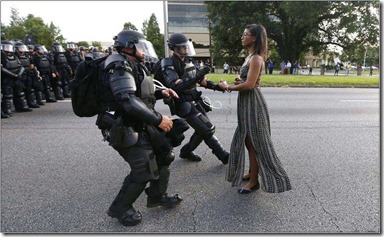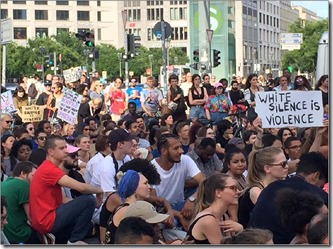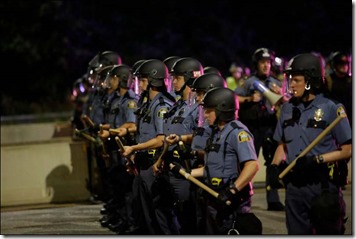Statement by CCDS, July 15 2016
Nearly every U.S. city has had Black Lives Matter protests in the two years since Michael Brown was killed by a police officer in Ferguson, MO. The Movement for Black Lives has been galvanized into action once again by shocking videos of the shooting deaths of Alton Sterling and Philando Castile at the hands of police. According to a July 10 National Public Radio report, over 200 protesters have been arrested in Louisiana, where Sterling was killed, and in Minnesota, where Castile was killed. These protests have been mirrored across the country over the last several days: thousands of protesters gathered in Oakland, CA on July 8 and blocked traffic in both directions on I-880; on July 8 and 9, 74 protesters were arrested in Rochester, NY; protesters in New York City held a moment of silence for the 11 police officers wounded or killed at a protest in Dallas, TX by lone gunman Micah Johnson, an Afghan War veteran. On July 11th the Chicago Alliance Against Racist and Political Repression, BLM, and Trinity United Church of Christ together mobilized 3,000 people in protest at Federal Plaza. More than 300 have been arrested across the U.S. protesting for justice in the last week.
The Committees of Correspondence for Democracy and Socialism joins hands in this movement calling for an end to what amounts to a war on Black America.
There has been a long movement for civil rights, equality and justice in the United States whose victories have been inscribed in our Constitution. But the seemingly unstoppable spree of police murders has drawn attention to the fact that the real status of human rights in our country today is another thing altogether. In addition to a documented increase in killings of African Americans by police–often amounting to nothing other than summary execution–our country suffers under an historically unprecedented level of incarceration. Nearly half of all federal and state prisoners were incarcerated for nonviolent drug, property or public order offenses. The U.S. response to migration across our southern border has been violent and repressive. Our homeland security programs–including mass electronic surveillance–are eroding freedom of expression and association. American Muslims face discriminatory investigations and prosecution. The United States steadfastly refuses to grant reasonable access to the United Nations Special Rapporteur on Torture, both to our prisons in Guantanamo Bay as well as those within our borders. Those most likely to suffer abuse are those with the least power: racial and ethnic minorities, immigrants, children, the poor and prisoners.
And yet our State Department lectures the world on human rights. The United States conducts unending drone killings of civilians in Pakistan, destroys entire countries such as Libya, Syria and Yemen, recklessly expands military operations in Eastern Europe and the South China Sea–all in the name of “humanitarian intervention.” No, nobody who has watched the video of Cleveland Police shooting down 12-year-old Tamir Rice in a drive-by encounter lasting no more than a few seconds, nobody who is awake, can believe this lie any longer.
To move racial and economic justice forward in our country, we must place demands on the state.
In a Los Angeles Times op-ed last March, former heads of state of Brazil, Colombia and Mexico flatly declared, “The ‘War on Drugs’ is an unmitigated disaster.” We must demand an end to the so-called War on Drugs.
 In a strange twist, another unmitigated disaster, the 1994 Crime Bill, provides an opening for promoting criminal justice reform. It permits the U.S. Department of Justice to investigate local police departments and place those found to be in violation of civil rights under a consent decree. In two decades, we have seen little improvement from Justice Department supervision. But things could improve if the Justice Department’s framework for consent decrees incorporated a crucial feature of the report of President Obama’s Task Force on 21st Century Policing. That feature is Action Item 2.2.3: “mandate the use of external and independent prosecutors in cases of police use of force resulting in death, officer-involved shootings resulting in injury or death, or in-custody deaths.” In this election season, we must pressure the Department of Justice to incorporate Action Item 2.2.3, the use of external and independent prosecutors, in their consent decree framework.
In a strange twist, another unmitigated disaster, the 1994 Crime Bill, provides an opening for promoting criminal justice reform. It permits the U.S. Department of Justice to investigate local police departments and place those found to be in violation of civil rights under a consent decree. In two decades, we have seen little improvement from Justice Department supervision. But things could improve if the Justice Department’s framework for consent decrees incorporated a crucial feature of the report of President Obama’s Task Force on 21st Century Policing. That feature is Action Item 2.2.3: “mandate the use of external and independent prosecutors in cases of police use of force resulting in death, officer-involved shootings resulting in injury or death, or in-custody deaths.” In this election season, we must pressure the Department of Justice to incorporate Action Item 2.2.3, the use of external and independent prosecutors, in their consent decree framework.
We support the Black Lives Matter movement and the many local organizations fighting police crimes, such as the Chicago Alliance Against Racist and Political Repression-led campaign for a Civilian Police Accountability Council (CPAC).
More than simply the right to live, people have the right to live in dignity. This connects the struggle against police brutality to the Fight for $15 and other living wage movements. We must raise Dr. King’s demand for a guaranteed income.
We must recall Dr. King’s courage in pointing out that there was a line that connected the vicious racism of the Selma, AL police with the illegal and immoral U.S. war on Viet Nam. He recognized that the United States was–and still is–the greatest purveyor of violence in the world today. On a very deep level, fighting racism at home calls for fighting to curb the U.S. war machine.
 The Committees of Correspondence for Democracy and Socialism has long believed that the problems we face have a systemic source, and that a better world is possible. With Dr. Martin Luther King, Jr., we believe that:
The Committees of Correspondence for Democracy and Socialism has long believed that the problems we face have a systemic source, and that a better world is possible. With Dr. Martin Luther King, Jr., we believe that:
“On the one hand we are called to play the good Samaritan on life’s roadside; but that will be only an initial act. One day we must come to see that the whole Jericho road must be transformed so that men and women will not be constantly beaten and robbed as they make their journey on life’s highway. True compassion is more than flinging a coin to a beggar; it is not haphazard and superficial. It comes to see that an edifice which produces beggars needs restructuring. A true revolution of values will soon look uneasily on the glaring contrast of poverty and wealth. With righteous indignation, it will look across the seas and see individual capitalists of the West investing huge sums of money in Asia, Africa and South America, only to take the profits out with no concern for the social betterment of the countries, and say: ‘This is not just.’”
